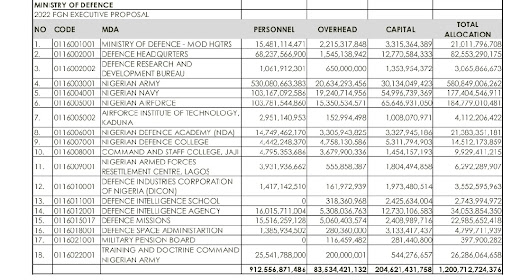Nigeria’s 2022 Budget Provides Funding For Additional Military Capabilities
The Nigerian gov’t has allocated over N1 trillion to the Defence sector operations and acquisitions. The budget is usually not a complete representation of defence procurement for the year.

Nigerian President, Muhammadu Buhari, recently signed the national budget for the fiscal year 2022, which allocates over N1 trillion for defense operations, procurement and upgrade of capabilities, and infrastructure.
The defence sector budget appropriation alongside funding for other security actors in the country was approved as part of the N17.126 trillion “Budget of Economic Growth and Sustainability” signed into law on Dec. 31, 2021 by the President.
During the presentation of the proposed budget earlier in Oct. of 2021, President Buhari had stated that security would continue to be top priority. He added that the government would continue to ensure that the men and women in the armed forces, police and paramilitary units were properly equipped, remunerated, and well-motivated.
While signing the budget after transmission by the Parliament, the President noted that the document provided for aggregate expenditures of N17.127 trillion, an increase of N735.85 billion as against the initial proposal for a total expenditure of N16.391 trillion. The President also stated that he would revert to the parliament “with a request for amendment “and/or” virement” as soon as they resume.
The defence allocation of N1.2 trillion comes months after the President accented to a N982.72 billion 2021 supplementary budget in Jul. 2021, which was designed for the provision of military hardware and COVID-19 response. Auxiliary budgets are often used by the government to purchase military equipment and to improve or fill capability gaps.
The defence budget in 2022 follows the pattern of other national budgets associated with limited details and the use of generic language to describe acquisitions. This is a trend HumAngle examined in its report on the need to strengthen security sector transparency and accountability.
The defence budget comprised expenditures of the various institutions including the Ministry of Defence, the Defence Headquarters, Army, Air Force, and Navy, in addition to other organisations such as Defence Intelligence, College, Missions and Industries.

The Ministry of Defence section included funding for rehabilitation of barracks, purchase of defence equipment and motor vehicles, and the ongoing assessment of APCs, equipment and facilities in the Nigerian Army, while the Defence Headquarters devoted funding for the procurement of ‘“military equipment,” utility vehicles, kits, arms and ammunition.
The Army Headquarters had generic lines mentioning construction projects, procurement of defense and security equipment.
The Navy assigned funds for projects such as the completion of helicopter hanger, construction of jetties, and establishment of Special Operations Command for Special Operations Forces, Explosive Ordnance Disposal (EOD), and diving unit.
Other projects included the procurement of SDB, Landing Ship Tank, utility vehicles, troop carriers, fast patrol boats, and rigid-hulled inflatable boats (RHIBs).
The Air Force is making a balance payment for the periodic depot maintenance of three L-39ZA. Over the years, the service has invested in maintenance and overhaul of the aircraft which are used for pilot training as well as reconnaissance and ground attack missions.
Funding is also assigned for aircraft arms and ammunition, and balance payment for periodic depot maintenance of C – 130H (NAF 918) transport aircraft, in addition to balance payment for procurement of two AW109 Trekker helicopters to replace the order for one AW139 helicopter and three JF-7 thunder aircraft.
It’s unclear if the JF-17 deal is for a new batch or part of an existing deal that has appeared in recent budgets. In May, the Air Force inducted three JF-17 Thunder multiple fighter jets, jointly manufactured by Chengdu Aircraft Industry Group of China and the Pakistan Aeronautical Complex.
Part-payment was designated for reactivation of two AS332 Super Puma helicopters, maintenance and upgrade of three MI helicopters and purchase of two KingAir 360, spares and support equipment which will serve as likely attrition replacement for the two Beechcraft KingAir B350i lost earlier in the year in February and May.
Support Our Journalism
There are millions of ordinary people affected by conflict in Africa whose stories are missing in the mainstream media. HumAngle is determined to tell those challenging and under-reported stories, hoping that the people impacted by these conflicts will find the safety and security they deserve.
To ensure that we continue to provide public service coverage, we have a small favour to ask you. We want you to be part of our journalistic endeavour by contributing a token to us.
Your donation will further promote a robust, free, and independent media.
Donate HereStay Closer To The Stories That Matter




